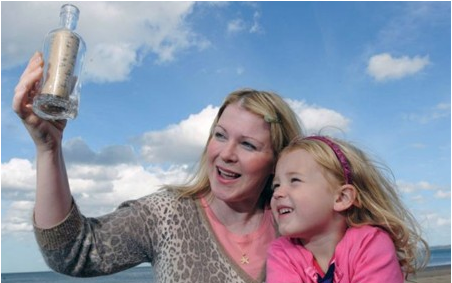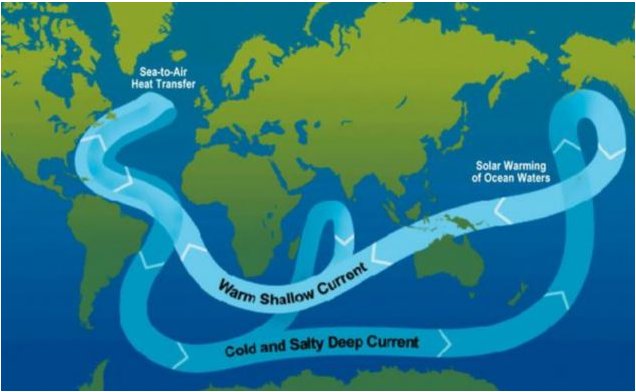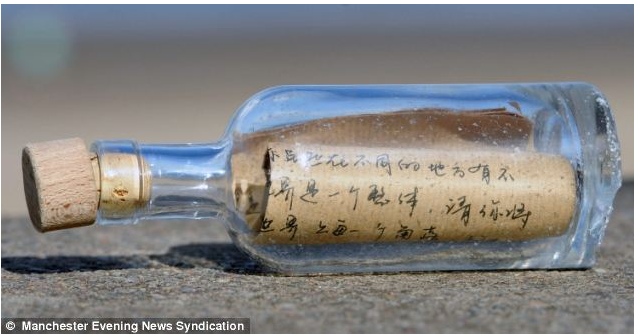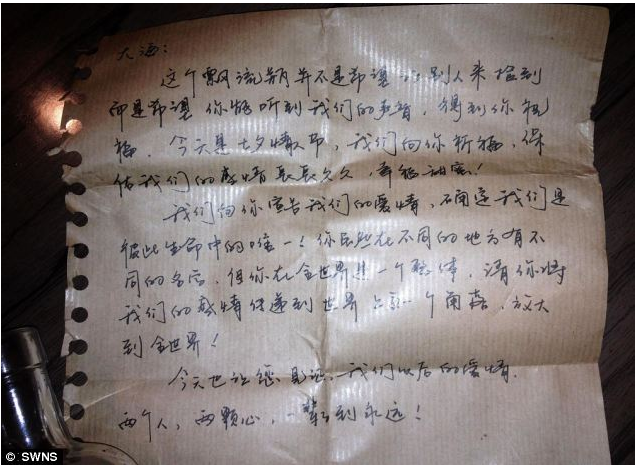
A romantic message-in-a-bottle discovered by a mother and daughter at a Socttish beach has sparked a mystery about whether it could have travelled 5,000 miles across the seas from China.
一對母女在蘇格蘭海灘撿到的漂流瓶引發(fā)了人們的猜疑:這只漂流瓶是如何穿越5000英里的大海,從中國漂到蘇格蘭的。
Nicola MacFarlane, 41, and daughter Lucy, four, from Portobello, near Edinburgh, were scouring Portobello Beach when they came across an old glass bottle sticking out of the sand containing a note inside written in Mandarin.
41歲的Nicola MacFarlan和4歲的女兒Lucy 來自愛丁堡附近波多貝羅,當(dāng)時她們正在清潔波多貝羅海灘,突然發(fā)現(xiàn)這個藏在沙子里的玻璃瓶,瓶子里裝有一封中文寫的信。
Now the family are trying to work out if the letter has managed the extraordinary journey across the Philippine Sea, into the Indian Ocean and through both the South Atlantic and the North Atlantic Ocean's before washing up on the shores of Great Britain.
現(xiàn)在這家人正在試圖搞清楚這封信的神奇之旅,它是如何穿越菲律賓海進(jìn)入印度洋,再穿越南北大西洋海域飄到英國海灘的。

It is unclear when the letter was sent off, as it was written on Chinese Valentine's Day, or Qixi Festival as it is more traditionally known, which falls on the seventh day of the seventh lunar month.
這封信是什么時候被扔進(jìn)海里的還不得而知,但是它寫于中國的傳統(tǒng)情人節(jié)七夕,也就是農(nóng)歷的七月初七。
While the letter bears the date in line with the lunar calendar - July 7, 2012 - it could have been sent off as recently as six days ago if it followed the modern calendar, which celebrated the occasion on August 23.
既然信是農(nóng)歷的七月初七寫的,那么它有可能是在六天前,也就是陽歷的8月23日寄出的。
Whether the message has travelled thousands of miles from China or whether it was penned by a love-struck pair much closer to home remains a mystery.
然而這信到底是從千里之外的中國漂洋而來,還是寫于附近國家的癡情情侶依然不得而知。
But for Nicola it doesn't matter - she was still excited to read about the Chinese love story after having it translated.
但是Nicola卻不介意,她對于能夠讀到翻譯過后的中國愛情故事感到興奮。
She said: 'I really do hope that it is from China but even it is from nearer to home, it's still a lovely gesture and an inspiring find. It's a love story regardless of where it came from.'
她說:“我確實(shí)非常希望這來自中國,但是即使來自于離我家不遠(yuǎn)的地方,這依然是一個愛情的象征,一個令人振奮的發(fā)現(xiàn)。這是一個無關(guān)乎距離的愛情故事。”

'We saw the bottle sticking out of the sand and just thought it was junk that someone had left behind.
“我們看到這個瓶子埋在沙子中的時候,還以為是誰遺留下的垃圾呢。”
'But after picking it up I noticed there was a piece of brown paper rolled up inside and there was some foreign writing on it.
“但當(dāng)我撿起來的時候我注意到瓶子里有一張卷起來的棕色信紙,有些外國文字在上面。”
'We quite excitedly took it home and carefully uncorked the bottle and took out the sheet of paper using some tweezers.
“我們興奮得把它帶回家,并小心翼翼的打開瓶子,用鑷子把紙拿了出來。”
'We knew it was Chinese, but we had no idea what it said.'
“我們知道這是中文,但是完全不知道寫的是什么。”
Unable to read the Mandarin text, Nicola turned to the internet and her Australian friend, Julie Gould, whose daughter attended a Chinese school in Sydney.
因?yàn)榭床欢形模琋icola求助了網(wǎng)絡(luò)和她的澳大利亞朋友Julie,Julie的女兒在悉尼的一所中文學(xué)校上學(xué)。
Several hours later Julie returned with the news that it was in fact a love letter.
幾個小時后,Julie 回復(fù)她說這實(shí)際上是一封情書。

Nicola said: 'It sounds to me like the couple are in love but cannot be together so they have sent the message to tell the world of their love.
Nicola說:“聽起來這像是一對相愛的情侶卻不能在一起,所以他們通過漂流瓶信息來告訴全世界他們的愛。”
'I'm blown away by it to be honest - it's incredible that it has travelled all this way.'
“說實(shí)話當(dāng)時我震驚了,要是真從中國漂流而來那就太不可思議了。”
In May 2008, a message in a bottle turned up on a Hebridean beach after completing a 4000-mile sea journey from the Bahamas.
在2008年的五月,在英國的赫布里底群島海灘也發(fā)現(xiàn)過這樣的瓶子,從4000英里外的巴哈馬群島漂來。











